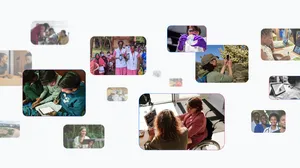Helping Australian teens hone media literacy skills

On April 28, 1996 at the historical Port Arthur site in Tasmania, 35 people were tragically killed. Alannah and Madeline Mikac, aged six and three, along with their mother, died that day. Because of this terrible act of violence, Alannah and Madeline's father, Walter Mikac AM, and a small group of volunteers, created the Alannah & Madeline Foundation with the belief that all children should have a safe and happy childhood. For more than 20 years, the Alannah & Madeline Foundation has worked to safeguard every child’s basic right to live free from violence and serves as a beacon of hope for a better, safer world.
As the dangers children face today become increasingly complex, the Foundation is adapting and responding to modern challenges. To help young people become less susceptible to online harms like disinformation and hate speech, the organization is focusing on helping teens better understand their relationships with media.
In Australia, as in the rest of the world, it’s more crucial than ever to help young people distinguish fact from fiction online. Research by Queensland University of Technology and Western Sydney University shows that many teenagers regularly consume news media, but their trust in the stories provided by news organizations has fallen significantly since 2017. More than half of young Australians pay little or no attention to the source of news stories found online, and only one third agree that they can tell “fake news” from real news. Teachers believe it's important to teach media literacy, but many feel constrained by barriers like a strict curriculum and a lack of confidence about the topic.
With support from Google.org, the Foundation set its sights on tackling this issue and worked with an advisory group of academics, industry experts and educators to develop Media Literacy Lab, a first-of-its-kind education resource for teachers and students aged 12-16. This e-learning platform helps Australia’s youth become media-savvy digital citizens, questioning what they see, practicing smart and safe online behaviors and seeking help when needed.
The Lab aims to both increase the media literacy of young Australians and support teachers to build their confidence in teaching the subject. Media Literacy Lab has two portals: one for teachers to administer the Lab and engage in professional learning, and one for students to experience narrative-based learning. In the Teacher Portal, educators can easily facilitate lessons, access resources and view real-time student reports. Media Literacy Lab’s gamified learning modules, including new and carefully curated content from our partners, sit in the Student Portal. Media Literacy Lab empowers students to strengthen their ethical understanding and critical thinking skills, crucial to navigate and thrive in today’s digital ecosystem.
In its first month, we saw almost 200 Australian schools register, with nearly 270 educators facilitating the Lab and more than 100 users from other non-school settings like libraries and universities—a huge achievement amid a global pandemic.
As we shifted to remote work in March as a result of COVID-19, we increasingly used Google for Nonprofits tools for organization and collaboration. Google Drive ensures our documents are protected, creating an easy way to invite the right people to contribute during product development. We simultaneously used Google Docs and Sheets for project management and content design documentation. The ability to collaboratively work with Google products was useful to keep project momentum.
The Foundation recently extended the period to register and use Media Literacy Lab free-of-charge until the end of 2021. Next year, we will deliver a national series of professional learning events for teachers with expert guests and hold student workshops in critical media production. We will continue to support national media literacy research, partnerships, advocacy campaigns and policy development. With additional funding, we also plan to build new modules for upper primary students.
Media Literacy Lab forms part of the Foundation’s crucial work in transforming how society thinks about–and responds to–the barriers to every child’s basic right to safety. We believe explicitly teaching young people media literacy can lead to strengthened digital civic engagement and contribute to safer civil discourse, benefiting children across Australia.






